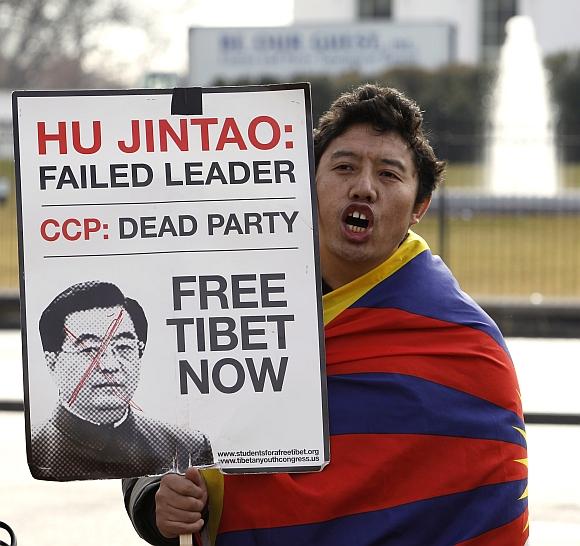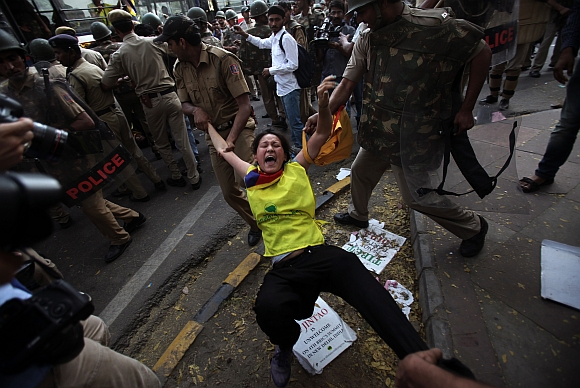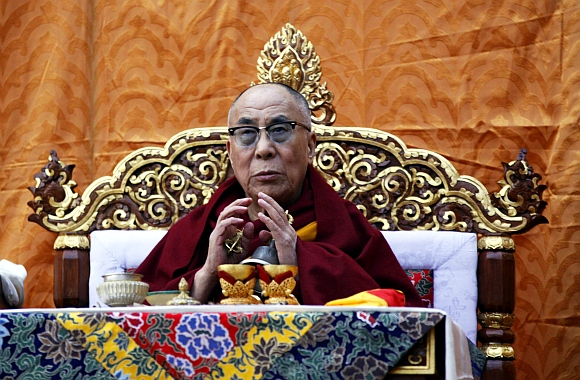 | « Back to article | Print this article |
An open letter to China's Hu Jintao
When the time will come to prepare your 'balance sheet' as China's core leader, it will be counted as your personal failure, you, the party's Tibet expert, longtime Tibet watcher Claude Arpi writes to Hu Jintao
Dear President Hu Jintao,
I am wondering if you believe in the Law of Karma.
You may not use that term in Marxist jargon, but you will admit that since the time you were elevated to the three highest posts of the People's Republic of China, you have been very closely 'connected' with Tibet.
It started on the last day of Prime Minister Rajiv Gandhi's memorable visit to China (December 23, 1989); on that day you were nominated party chief of the Tibetan Autonomous Region. It was the beginning of your long association with the Land of Snows.
You surely remember that three days earlier, Comrade Deng Xiaoping had greeted India's prime minister with a warm 'my young friend'. Deng told Rajiv, "Starting with your visit, we will restore our relations as friends; the time had come to forget the past and look forward to the future."
For centuries, Tibet has been closely linked with India for historic, religious and cultural reasons; the 1988 Sino-Indian joint statement acknowledged this interrelatedness.
During the preceding few months, the party had been nervous about the situation in Tibet: monks and nuns had begun to revolt against their 'motherland'.
On December 10, 1988, riots occurred in Lhasa (according to official sources one person died; unofficial sources speak of 12).
Many must have thought: if the situation is allowed to drift, China could follow the Soviet Union on the way to disintegration. Something had to be done.
It is why you, a promising young cadre, were sent to Lhasa as party chief. You had a tremendous challenge in front of you; you had to show results in very short time to repay the confidence placed in you by the politburo.
You reached the rebellious province on January 12, 1989. Soon after, on January 23, you paid a visit to the Tashilhunpo monastery in Shigatse. The respected 10th Panchen Lama, the second highest ranking Tibetan Lama after the Dalai Lama, accompanied you; the official occasion was the consecration of a stupa containing the mortal remains of one of the previous Panchen Lamas.
To everyone's surprise, during the function, the Panchen Lama denounced the Communist Party's role in Tibet: "Although there had been developments in Tibet since its liberation, this development had cost more dearly than its achievements." It must have been such a shock for you. Four days later, the Lama passed away in mysterious circumstances.
Click on NEXT to read more...
An open letter to China's Hu Jintao
When a demonstration erupted in Lhasa on March 5, 1989, you asked the People's Armed Police to take control of the situation. Eyewitnesses later said that on that day, hundreds of Tibetans were killed around the Jokhang Central Cathedral in Lhasa. It has never been verified by independent sources.
Three days later, with the blessings of the central leadership, you decided to clamp down martial law in Tibet; it was to last an entire year. It was like a rehearsal for another momentous event: the student rebellion on Tiananmen Square in April/May/June '89.
Your actions in Tibet were perhaps an inspiration for the Elders who decided to save China from the 'chaos' in which the country was plunged.
In November 2002, you were finally anointed general secretary of the party. Many observers believe that your karmic 'connection' with Tibet helped you to become the 'core leader of the Fourth Generation'.
Since then, you have been the CCP's 'Tibet expert'.
A few weeks before you took over the helm of the Middle Kingdom, agencies carried the news that a Tibetan team led by Lodi Gyari, the Dalai Lama's special envoy, had left for Beijing to 'talk' with your government. Though it was described as private visit and 'a chance for exiled Tibetan leaders to see the progress in their homeland', it created great hopes in China and India where more than a lakh of Tibetans live as refugees.
A year earlier, a Tibet policy had been put in place during the fourth Tibet work forum under the chairmanship of President Jiang Zemin. It was planned to give a strong impetus to economic and social development, while preserving the 'stability' of the region.
Though development was brought to Tibet (particularly with the opening of the railway line to Lhasa in 2006), stability was never achieved. Worse, in March/April 2008, unrest erupted again all over Tibet. It must have sent a shockwave through the spines of your politburo colleagues who do not have your knowledge of the ground situation in Tibet.
It is unfortunate that despite nine rounds of talks since 2002 between your united front work department's officials and the Dalai Lama's representatives, no breakthrough could be achieved and no acceptable formula for the future of Tibet could be found.
During your tenure, you always insisted on three points: the peaceful rise of China, scientific development, and internal stability. The importance of stability was reiterated during the recent National People's Congress.
When you had convened the fifth Tibet work forum in January 2010 (attended by the 300 senior-most party cadres, PLA generals and your politburo standing committee's colleagues), you declared: 'We must also soberly understand that Tibet's development and stability are still faced with many difficulties and challenges and have encountered many new situations and new issues.'
Click on NEXT to read more...
An open letter to China's Hu Jintao
Though stability was the core of your Tibet policy, you have not achieved any significant results in the minority nationalities areas. In recent months, agitation has taken a novel form: self-immolation by monks and nuns (some 30 in less than a year) and large-scale demonstrations.
The Tibet Daily said that when you talked to a Tibetan delegation who called on you during the NPC's conference; you encouraged them to promote the 'old Tibetan spirit'. You explained: 'It would be necessary to be firm on anti-secession'. You told them that you wanted to recruit and train party leaders who are 'politically reliable, capable of safeguarding national unity, firm on anti-secession, and who dare to fight against the Dalai Lama group'.
When you speak of 'stability', it seems to me that you entire policy is aimed at denigrating the Dalai Lama.
Your website China Tibet Online published a number of postings purportedly attributed to Chinese netizens: 'If the Dalai Lama could hire others to set themselves on fire, why doesn't he burn himself?' How does it help?
Already, in 2008, Zhang Qingli, the then party chief in Lhasa had called the Tibetan leader a 'wolf in monk's garb'; more recently, he was painted as a Nazi in official publications.
Will this atrocious propaganda help dissipate the Tibetans' resentment against repressive measures? In my opinion, the answer is 'no'.
But when the time will come to prepare your 'balance sheet' as China's core leader, it will be counted as your personal failure, you, the party's Tibet expert.
If you are unable to quickly change the tide, your leadership will go down in history as the darkest in relations with the 'minorities'. This will remain in the annals of the People's Republic of China.
You have six months to change this.
One way out would be to personally meet the Dalai Lama and threadbare discuss the situation with him. Do not forget that he remains the key to any solution for the Tibetan issue.
Both of you could certainly find a solution to the thorny issue of 'autonomy' in Tibetan areas. Is it not written in your own constitution?
I sincerely hope that you will boldly take a step forward; it could save your presidency and give a brighter future to the People's Republic of China.
In India one believes that karma can be changed.
Yours sincerely
Claude Arpi


